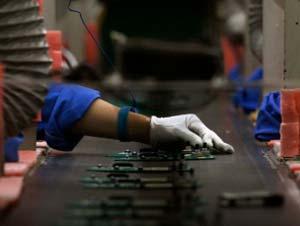Silicon Sweatshops
(image: globalpost.com)
The following is not a full transcript; for full story, listen to audio.
As Americans start shoping for the holidays, the investigative journalism website globalpost.com is taking a closer look at conditions for workers in some of the factories that make the components for the hottest electronic gadgets this season.
By the time your new iPhone gets into your hands, it has passed through many different hands across many different countries, says Global Post Managing Editor Thomas Mucha. “Let’s think about all the parts that go into every iPhone or similar product. We’re talking flash memory chips, we’re talking camera parts, touchscreen glass, GPS receivers, antenna switches, headphone amplifiers; plus all the plastics and rubber and all the other silicon bits that go into them.
“Now before these final products hit US stores, all these many parts need to be manufactured and assembled by thousands of workers across hundreds of companies, across many countries, in all different legal jurisdictions. So it’s a very complex management challenge to say the least.”
In 2006, Apple conducted its own audit of the factories that produced its iPods after media reports revealed that some workers were taking on excessive overtime hours.
These cases are an embarrassment to companies like Apple, according to Mucha, and have prompted them to implement codes of conduct for their suppliers, specific rules and regulations around the treatment of workers. Mucha argues that while these codes are good PR, they’re not working to fix the problems.
Apple updated its study, published in February 2009. It found 60 percent of audited suppliers violated its code of conduct guidelines of work days and days off.
“The problem is compounded by a lack of transparency you get along the whole Asian supply chains,” said Mucha. “They’re notoriously murky. Contractors can shift orders across borders and between factories and over to this subcontractor or that subcontractor. Meanwhile, many major brands treat these supplier lists as top secret information, so that makes it difficult to pin down who’s making what for whom, and therefore difficult to know who to hold accountable when these allegations of abuse come to light.”
In their report, GlobalPost reporters did find the practices of one company, Hewlett-Packard, that seemed to be improving the situationn for factory workers. The company partnered with labor rights groups and NGOs to help improve conditions in a parts factory in Dongguan, in Southern China. Here, workers were paid for annual leave and received free annual medical checkups, among other things.
“But most importantly, these workers say they know their rights and the management listens to them,” said Mucha.
GlobalPost’s investigative report, “Silicon Sweatshops,” focused on Taiwanese and Chinese workers, along with Filipino migrant workers, and uncovered issues ranging from violations of industry codes of conduct on work hours and worker complaint mechanisms, to the right to organize and underage labor.
“The point of the investigation was to show the human face that goes into all these products that we’re all lapping up every year,” said Mucha. “You should know that if you’re going to buy an iPhone, or if you’re going to buy an iPod, if you’re going to buy all of these gadgets, that there are people at the other end of these things, and sometimes people who are being exploited and treated unfairly.”
Bob Edwards Weekend” is a two-hour interview showcase, in which celebrated host Bob Edwards highlights the life and work of interesting people, from newsmakers, historians, and authors to artists, actors, and regular folks too. The show is produced by XM Satellite Radio and distributed nationwide by PRI.
